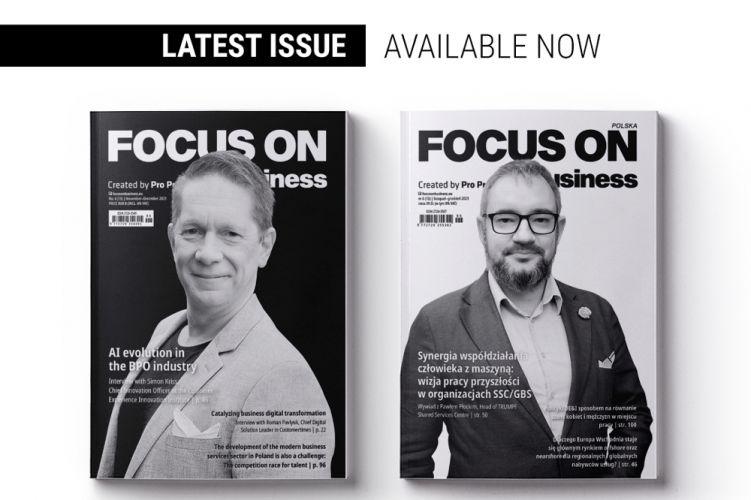AI evolution in the BPO industry

In the exclusive interview with Simon Kriss, Chief Innovation Officer at the Customer Experience Innovation Institute, we explore the dynamic intersection of innovation, ethics, and the evolving landscape of AI in the business process outsourcing (BPO) industry.
Simon visited Poland in October 2023 to present his latest book, “The AI Empowered Customer Experience,” a comprehensive guide for CX practitioners on the multifaceted applications of AI. Join us as we delve into the intriguing insights of this CX industry thought leader and futurologist regarding the future of AI in the BPO sector.
Wiktor Doktór, Pro Progressio: Could you please provide an overview of how AI is currently influencing and shaping the BPO industry, and the broader impact this technology is having on businesses at large?
Simon Kriss, Customer Experience Innovation Institute: AI is not yet what is known as Artificial General Intelligence, but it’s knocking on the door of that. Although it is still Artificial Narrow Intelligence, it’s become a lot more human- like. Generative AI cannot understand empathy itself, but it can fake empathy very well. It can understand a lot more about what people want, what people need, and then go and meet those needs.
That, of course, is an immediate threat for a traditional voice only BPO. Not so much of a threat for, let’s say, a BPO that's handling new coding and similar processes; although we are starting to see Generative AI being used a lot more often to both repair and generate code. It is one of those times when the whole industry is going to fundamentally shift. In a sense, it’s similar to the 1970s, when there were hardly any BPOs. Then the concept of a BPO came along and changed the industry forever. This is what we are observing with regard to AI today.
How rapidly do you anticipate AI advancing within the BPO sector? Could you offer a timeline for the adoption and integration of advanced AI solutions into BPO operations?
I believe there are two answers to that question. The first one is depends on how quickly a BPOs clients’ are going to implement AI. I have already seen a BPO lose 700 seats because their client stepped into AI and RPA and therefore didn't need as many staff anymore. When the contract came up for renewal they simply didn't renew, meaning 700 jobs were gone.
Now, there’s a different timeline for BPOs themselves taking on AI. To date, I almost can't point to a BPO that has seriously taken AI into their business. They will all need to do this within the next
12 to 18 months. They do not have a long runway at all. Because of the speed with which this technology is moving, the first few BPOs that lean into AI are going to beat the others, and take market share fast.
Do you believe that BPO clients will play a pivotal role in driving creative AI applications within the industry, or will BPO service providers take the lead in offering AI-based solutions to their clients?
I am seeing the first option more frequently right now. Customers are being more creative, and pushing that into the BPO model saying: you're my BPO, why don't you know this? I think that must change, and it must change NOW.
If there is any one group across the entire CX industry who needs to understand and move into AI, it must be the BPOs. Having said that, they are going to have to do it in a way where that move is safe, secured, tested, and validated – when your client is Nike, Adidas, or Puma they are all going to ask what models you are using, are you are using AI is a responsible and ethical way, what bias exists and how do you counter for that, and so much more.
Even more than their clients, it’s the BPOs that are going to have to deeply understand AI and build real strength in it.
When considering various regions around the world, such as North America, LATAM, Europe, Africa, Asia, and Australia where you come from, do you see differences in speed and extent in AI adoption for service deli very, or is this trend fairly consistent on the global scale?
Currently, we're seeing the USA racing ahead, which is directly correlated to the fact that the vast majority of the startups are there. As of yet, most of the big players in the CX space – think Genesys or NICE – haven't extensively leaned into Generative AI. Verint have just released 28 AI applications, so they're definitely leading right now. One of the things that is slowing all of the large players down is that when you buy Genesys, NICE or Verint, you know that they are SOC 2 compliant, they are secure, they are GDPR compliant, etc. The new startups don't have to play by those rules and are not offering those things yet.
Most people taking on AI face a dilemma: do I take a chance and go with the startups that I can get right now, or do I play a more cautious game and wait for the big players to release all the functionality. Whoever I advise on this, I recommend taking a double strategy – go and grab a startup's product, start using it for the next 6 months while the big players are lagging behind. By the time they release their functionality, you already know what you're doing with it. You know how you're going to use it. It is throw away money, but the learning you will get will make it worthwhile.
Looking into the future, what developments and changes can we expect in the presence of AI within the BPO industry one year from now?
I think every BPO in the world – unless they are very limited in size – will have some form of AI running. That may just be an internal HR chatbot that allows the thousand workers in the call center to access and understand the HR systems more easily, but they will all be doing something.
BPOs journeys are going to depend on who their clients are – what I mean by this is, if their clients are government departments, banks, insurance companies, then they are always going to move slowly because they are more highly regulated.
Having said that, if you are doing work for Tesla and SpaceX, you are going to be right at the front. And that will happen across the 2024. Mark my words.

Your recent book delves into AI and its applications. Could you highlight the key topics and themes covered in your book?
Thanks for mentioning the book. I wrote it in June, and I put a disclaimer that said this book is right on July 1st, but don't come and see me on July 2nd because the technology is moving so fast. And, although it's only been a couple of months, I already feel like I need to write an updated version.
There are five areas that I focus on. The first one is just talking about AI – what is it and how it works. Most people still don’t understand the core of how AI works.
The next three big chapters – which is most of the book – focuses on use cases in customer experience, employee experience, and operational efficiency. Then I cover risks, because there are a lot of risks in this area. That being said, I also believe that the opportunities out weigh the risks, but we need to be aware of them.
The final chapter delves into the meaning of ethical and responsible AI.
The book also touches on some of the legislation that's out there. As of today, no country has legislation around AI. The closest one is the EU which has a risk framework, but it hasn't been voted in as legislation yet. It is rumored that the US President will sign an Executive Order around AI soon.
Every country is grappling with legislation and everybody is facing the issue of controlling a technology that is growing at lightning speed.
The book is designed not to be a super technical read, so I wouldn't give it to your CIO. It's designed for business users, it is written in business language, and gives tips on how to leverage the technology.
Thank you very much for an inspiring interview.
Listen to the full version of the interview in the FOCUS ON Business podcast.
The Simon’s book is available from Amazon in both paperback and Kindle versions: https://www.amazon.com.au/dp/B0C9SBNW3N
This interview has been edited for length and clarity.
This article comes from magazine:
FOCUS ON Business #13 November-December (6/2023)
 Check the issue
Check the issue







